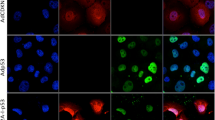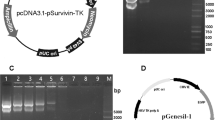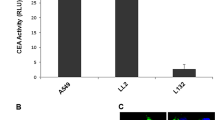Abstract
Transcriptional targeting of gene expression has been plagued by the weakness of tissue-specific promoters. Thus, to increase promoter strength while maintaining tissue specificity, we constructed a recombinant adenovirus containing a binary promoter system with a tumor-specific promoter (CEA; carcinoembryonic antigen) driving a transcription transactivator, which then activates a minimal promoter to express a suicide gene (HSV-tk; herpes simplex virus thymidine kinase). This ADV/binary-tk induced equal or greater cell killing in a CEA-specific manner in vitro compared with the CEA-independent killing of a vector with a constitutive viral promoter driving HSV-tk (ADV/RSV-tk). To monitor adenovirus-mediated HSV-tk gene expression in vivo, we employed noninvasive nuclear imaging using a radioiodinated nucleoside analog ([131I]-FIAU) serving as a substrate for HSV-tk. [131I]-FIAU-derived radioactivity accumulated after intratumoral injection of ADV/binary-tk only in the area of CEA-positive tumors with significantly less spread to the adjacent liver tissue than after administration of the universally expressed ADV/RSV-tk. Both viruses exhibited similar antitumor efficacy upon injection of liver metastases. Importantly, in vivo dose escalation studies demonstrated significantly reduced toxicity after intravenous administration of ADV/binary-tk versus ADV/RSV-tk. In summary, the increased therapeutic index of this novel, amplified CEA-driven suicide gene therapy vector is a proof of principle for the powerful enhancement of a weak tissue-specific promoter for effective tumor restricted gene expression.
This is a preview of subscription content, access via your institution
Access options
Subscribe to this journal
Receive 12 print issues and online access
$259.00 per year
only $21.58 per issue
Buy this article
- Purchase on Springer Link
- Instant access to full article PDF
Prices may be subject to local taxes which are calculated during checkout







Similar content being viewed by others
References
Chen S.H. et al. Gene therapy for brain tumors: regression of experimental gliomas by adenovirus-mediated gene transfer in vivo Proc Natl Acad Sci USA 1994 91: 3054 3054
O'Malley B.W., Chen S.H., Schwartz M.R., Woo S.L. . Adenovirus-mediated gene therapy for human head and neck squamous cell cancer in a nude mouse model Cancer Res 1995 55: 1080 1080
van der Eb M.M. et al. Severe hepatic dysfunction after adenovirus-mediated transfer of the herpes simplex virus thymidine kinase gene and ganciclovir administration Gene Therapy 1998 5: 451 451
Brand K. et al. Liver-associated toxicity of the HSV-tk/GCV approach and adenoviral vectors Cancer Gene Ther 1997 4: 9 9
Qian C. et al. Gene transfer and therapy with adenoviral vector in rats with diethylnitrosamine-induced hepatocellular carcinoma Hum Gene Ther 1997 8: 349 349
Chen L. et al. Breast cancer selective gene expression and therapy mediated by recombinant adenoviruses containing the DF3/MUC1 promoter J Clin Invest 1995 96: 2775 2775
Siders W.M., Halloran P.J., Fenton R.G. . Transcriptional targeting of recombinant adenoviruses to human and murine melanoma cells Cancer Res 1996 56: 5638 5638
Su H., Chang J.C., Xu S.M., Kan Y.W. . Selective killing of AFP-positive hepatocellular carcinoma cells by adeno-associated virus transfer of the herpes simplex virus thymidine kinase gene Hum Gene Ther 1996 7: 463 463
He D. et al. Adenovirus-mediated expression of PML suppresses growth and tumorigenicity of prostate cancer cells Cancer Res 1997 57: 1868 1868
Chen J. et al. A glial-specific, repressible, adenovirus vector for brain tumor gene therapy Cancer Res 1998 58: 3504 3504
Adachi Y. et al. Midkine promoter-based adenoviral vector gene delivery for pediatric solid tumors Cancer Res 2000 60: 4305 4305
Brand K. et al. Tumor cell-specific transgene expression prevents liver toxicity of the adeno-HSVtk/GCV approach Gene Therapy 1998 5: 1363 1363
Lan K.H. et al. Tumor-specific gene expression in carcinoembryonic antigen-producing gastric cancer cells using adenovirus vectors Gastroenterology 1996 111: 1241 1241
Lan K.H. et al. In vivo selective gene expression and therapy-mediated by adenoviral vectors for human carcinoembryonic antigen-producing gastric carcinoma Cancer Res 1997 57: 4279 4279
Osaki T. et al. Gene therapy for carcinoembryonic antigen-producing human lung cancer cells by cell type-specific expression of herpes simplex virus thymidine kinase gene Cancer Res 1994 54: 5258 5258
Tanaka T. et al. Adenovirus-mediated prodrug gene therapy for carcinoembryonic antigen-producing human gastric carcinoma cells in vitro Cancer Res 1996 56: 1341 1341
Tanaka T. et al. Adenovirus-mediated gene therapy of gastric carcinoma using cancer-specific gene expression in vivo Biochem Biophys Res Commun 1997 231: 775 775
Kijima T. et al. Application of the Cre recombinase/loxP system further enhances antitumor effects in cell type-specific gene therapy against carcinoembryonic antigen-producing cancer Cancer Res 1999 59: 4906 4906
Sato Y. et al. Enhanced and specific gene expression via tissue-specific production of Cre recombinase using adenovirus vector Biochem Biophys Res Commun 1998 244: 455 455
Sadowski I., Ma J., Triezenberg S., Ptashne M. . GAL4-VP16 is an unusually potent transcriptional activator Nature 1988 335: 563 563
Kwong Y.L. et al. Adenoviral-mediated suicide gene therapy for hepatic metastases of breast cancer Cancer Gene Ther 1996 3: 339 339
Wildner O. et al. Adenoviral vectors capable of replication improve the efficacy of HSVtk/GCV suicide gene therapy of cancer Gene Therapy 1999 6: 57 57
Aoki K. et al. Restricted expression of an adenoviral vector encoding Fas ligand (CD95L) enhances safety for cancer gene therapy Mol Ther 2000 1: 555 555
Sterman D.H. et al. Adenovirus-mediated herpes simplex virus thymidine kinase/ganciclovir gene therapy in patients with localized malignancy: results of a phase I clinical trial in malignant mesothelioma Hum Gene Ther 1998 9: 1083 1083
Trask T.W. et al. Phase I study of adenoviral delivery of the HSV-tk gene and ganciclovir administration in patients with current malignant brain tumors Mol Ther 2000 1: 195 195
Toloza E.M. et al. In vivo cancer gene therapy with a recombinant interleukin-2 adenovirus vector Cancer Gene Ther 1996 3: 11 11
Arbuthnot P.B. et al. In vitro and in vivo hepatoma cell-specific expression of a gene transferred with an adenoviral vector Hum Gene Ther 1996 7: 1503 1503
DiMaio J.M. et al. Directed enzyme pro-drug gene therapy for pancreatic cancer in vivo Surgery 1994 116: 205 205
Gerber M.A., Thung S.N. . Carcinoembryonic antigen in normal and diseased liver tissue Am J Pathol 1978 92: 671 671
Qiao J., Black M.E., Caruso M. . Enhanced ganciclovir killing and bystander effect of human tumor cells transduced with a retroviral vector carrying a herpes simplex virus thymidine kinase gene mutant Hum Gene Ther 2000 11: 1569 1569
Zimmermann W., Ortlieb B., Friedrich R., von Kleist S. . Isolation and characterization of cDNA clones encoding the human carcinoembryonic antigen reveal a highly conserved repeating structure Proc Natl Acad Sci USA 1987 84: 2960 2960
Graham F.L., Smiley J., Russell W.C., Nairn R. . Characteristics of a human cell line transformed by DNA from human adenovirus type 5. J Gen Virol 1977 36: 59 59
Danielson K.G. et al. Epithelial mouse mammary cell line exhibiting normal morphogenesis in vivo and functional differentiation in vitro Proc Natl Acad Sci USA 1984 81: 3756 3756
Schrewe H. et al. Cloning of the complete gene for carcinoembryonic antigen: analysis of its promoter indicates a region conveying cell type-specific expression Mol Cell Biol 1990 10: 2738 2738
Kakidani H., Ptashne M. . GAL4 activates gene expression in mammalian cells Cell 1988 52: 161 161
Fang B. et al. Gene therapy for phenylketonuria: phenotypic correction in a genetically deficient mouse model by adenovirus-mediated hepatic gene transfer Gene Therapy 1994 1: 247 247
Kay M.A. et al. In vivo hepatic gene therapy: complete albeit transient correction of factor IX deficiency in hemophilia B dogs Proc Natl Acad Sci USA 1994 91: 2353 2353
Chen S.H. et al. Combination gene therapy for liver metastasis of colon carcinoma in vivo Proc Natl Acad Sci USA 1995 92: 2577 2577
Tjuvajev J.G. et al. Imaging adenoviral-mediated herpes virus thymidine kinase gene transfer and expression in vivo Cancer Res 1999 59: 5186 5186
Acknowledgements
The authors wish to thank Dr Manuel Caruso for the helpful discussions and Dr Olivier Martinet for the editing of this manuscript. This research was supported in part by NIH grants R29 CA-70337; R01 CA-75175; R01 CA84404 to SH Chen. The work performed at MSKCC was partially supported by funding from NIH RO1 CA69769, NIH RO1 CA76177, NIH RO24 CA98023 and DOE 86ER60407.
Author information
Authors and Affiliations
Rights and permissions
About this article
Cite this article
Qiao, J., Doubrovin, M., Sauter, B. et al. Tumor-specific transcriptional targeting of suicide gene therapy. Gene Ther 9, 168–175 (2002). https://doi.org/10.1038/sj.gt.3301618
Received:
Accepted:
Published:
Issue Date:
DOI: https://doi.org/10.1038/sj.gt.3301618
Keywords
This article is cited by
-
CMV enhancer may not be suitable for tissue-specific enhancement of promoters in cancer gene therapy
Cancer Gene Therapy (2020)
-
Molecular Bio-Imaging Probe for Non-Invasive Differentiation Between Human Leiomyoma Versus Leiomyosarcoma
Reproductive Sciences (2020)
-
Intrabodies against the Polysialyltransferases ST8SiaII and ST8SiaIV inhibit Polysialylation of NCAM in rhabdomyosarcoma tumor cells
BMC Biotechnology (2017)
-
Combination of hepatocyte specific delivery and transformation dependent expression of shRNA inducing transcriptional gene silencing of c-Myc promoter in hepatocellular carcinoma cells
BMC Cancer (2014)
-
A Molecular Imaging System Based on Both Transcriptional and Genomic Amplification to Detect Prostate Cancer Cells In Vivo
Molecular Therapy (2013)



